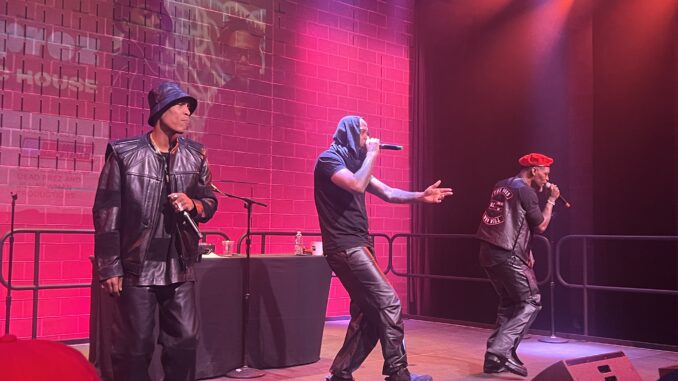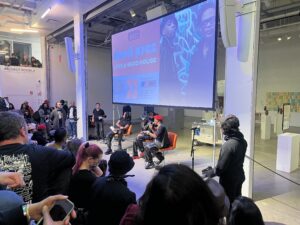
By Jaida Dent
Celebrating the 25th anniversary of their debut album, “Let’s Get Free”, hip-hop duo, Dead Prez, spoke at BRIC’s Stoop Share Series on Friday, March 28th. Presented by Hip-Hop Wire and co-produced by Dead Prez and Jill Newman Productions, the event featured a conversation with Dead Prez followed by a concert in the BRIC ballroom.

Founded in 1979, BRIC is a non-profit arts organization that offers free to low cost media related courses like photography, video editing, podcasting, and TV production. The organization also hosts art exhibitions, poetry slams, music festivals, and panel discussions. The Stoop Share Series creates a platform for artists to utilize the BRIC stoop, an area of the building, to host an event.
“The Stoop is a very intentional name. It is part of our community, it’s part of our city landscape, but it’s part of Brooklyn […] Stoop Share here at BRIC is this space and we share it with our community through a subsidy program and in that subsidized program, artists do not pay to use this space,” said Carmen Hernandez, the senior director of Community Impact at BRIC.
Coined as a political hip-hop duo, M-1 and Stic.man formed Dead Prez over two decades ago and have used their music as a form of activism geared towards political liberation. Their debut album “Let’s Get Free” discusses issues like economics, the prison system, police brutality, and oppression. Though released in the year 2000, messages from the album can still be applied to the social events we see today.
“The best rap has often served as a cultural and political diagnosis. But Dead Prez didn’t simply observe and analyze, they offered a solution: revolution,” said Rawiya Kameir, a writer and critic, in a review of the album for Pitchfork.
The conversation started with what the duo sees as the five qualities of revolutionary music: truth, risk, impact, timelessness/timeliness, and freedom. Truth encompasses being true to yourself as an artist, but also being accurate in their message. Risk is a factor expected when participating in this type of work and artists should have a sense of risk management when creating revolutionary music. Impact goes hand in hand with timelessness and timeliness when thinking about who the music is speaking to and how relevant it is to any time period. Lastly, freedom is a value that revolutionary music strives to achieve. These values are ones that the duo hold themselves to as well and can be seen in their body of work.
“When you look at music in popular culture or in really any art form, not even just music, there’s going to be an element of truth and authenticity […] Ultimately, [it] is going to add on to our consciousness towards developing what freedom can look like through our imagination and then in real-time,” said Stic.man
Beyond the qualities of revolutionary music, the duo creates the distinction between protest music and progress music. While protest music is important to express issues an artist may be against, it is equally important to voice the issues that you stand for in your music. The duo cites Bob Marley as an inspiration for progress music in his messages of “One Love”. Out of progress music, Stic.man created “Fit-Hop” after wanting to address health and well-being issues. His albums “The Workout” and “The Workout 2” are songs created with positive messages that people can listen to as they workout.
“When we go to the gym, when we keep our physical temples sharp and working, we need music that supports that. A lot of times, we’re listening to the hard stuff because it’s got that edge and it pushes you, but the little seeds of negativity in the music, you don’t really want to hear that when you’re trying to grow, but you want something strong and solid. So, I saw an opportunity as an artist to create that,” said Stic.man
The duo also discussed the idea of ownership for an artist and what legacy means to them. Though success can be measured in many ways, an artist must have their own metric of success. To Dead Prez, legacy, equity, and integrity are factors that can help someone define their success, and with success comes sacrifice. Being able to say things that may come with a risk is worth it in the long run, and has been the strategy that Dead Prez founded themselves upon over 20 years ago.
“25 years ago, making ‘Let’s Get Free, ’ we did think, this could be the last time we could say anything to our people. So this is what we will say, and if that’s what we have to say, then let’s say it with all that we mean and knowing that many years later, it could mean something. I’m hoping that artists today can take that kind of sacrifice for the future as well,” said M-1
When asked about current artists they see that are creating progressive music and advocating for important movements, the duo doesn’t see the same culture that created them present in today’s music. The duo hopes for a change in the culture to see more artists taking a chance and using their music to push for social change.
“The science that was in the music that fed me. I don’t see it anymore. I’m going to say we need to create the culture that creates the artists that are then giving us what needs to be heard […] I’m a revolutionary until I die. So, that fight, I’m looking for that. I’m looking for that in the youth,” said M-1.
Hip-hop has been seen as a vessel for creative activism, but the genre we know today has strayed away from politics. For Dead Prez, their purpose as a group is to aid the social movements that occur today, whether it be Black Lives Matter or fighting to free the wrongfully incarcerated. Their music has been a soundtrack for the progress they fight to see and they are grateful for being able to fulfill that role.
“We are cultural workers in service to the movement. We always have been, not rappers, like never wanted it that, at all,” said M-1. “I just gotta say, thank you for having a movement that we could be at service to. It’s hard to articulate when I think, and in my mind, this art is made for this reason.”
